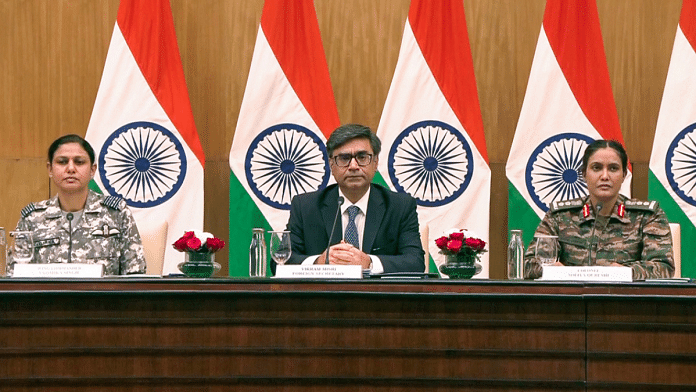Unlike the Pahalgam terror attack, which had the element of surprise, the Indian Army’s retaliatory attack was not a secret. Islamabad was expecting a strong response from India, as its ministers and army personnel have been saying in public.
By calling India’s targeting of terror bases ‘attacks’ on Pakistan Army infrastructure, the political and military establishments of Pakistan have provided proof of their complicity in the Pahalgam attack.
Pakistan’s civilian leadership has repeatedly called India’s response cowardly and shameful, speaking the language of the army and the Inter-Services Intelligence (ISI). It should, therefore, take equal responsibility for the consequences. Pakistan’s Prime Minister Shehbaz Sharif, in a recent to the nation, said that India must “suffer the consequences” of its attack. Pakistan’s defence minister Khawaja Asif that, while Islamabad is “trying to avoid” a full-fledged war with New Delhi, India’s attack marked an “invitation to expand the conflict”.
One would have expected Pakistan to condemn the terror attack on civilian tourists – all of them Hindus – and strongly cooperate with India on nabbing the culprits. This would have led New Delhi to believe that the party in power is ready to distance itself from the string pullers of terrorism in its army. Shehbaz Sharif’s claim that Pakistan will not retreat (from a counter-attack or war if foisted upon them), amplifies the fact that it is in denial mode. Pakistan Army is calling the shots and will continue to escalate in order to maintain its supremacy within the country.
Some Western nations are urging India to ‘refrain from escalating the war’, which isn’t new. This, they say, is because both India and Pakistan are nuclear powers, and the risk of the war escalating to the nuclear conflict domain is greater in the present scenario. Nothing could be more hypocritical and further from the truth.
India has made it very clear that it will not take terror attacks lying down, nor would it allow perpetrators of such heinous crimes against humanity to go unpunished. No matter what the status of the country that breeds terrorists, India will retaliate – this time with a force perhaps never witnessed before.
Besides, this is not the first time that two countries with nuclear war capabilities are engaged in conflict. Europe and America were in support of Ukraine against Russia, a nuclear power. The India-China stand-off and earlier India-Pakistan conflicts have all been in the shadow of the countries’ nuclear capabilities. Yet, none of these military engagements veered off to a full-scale war or a mutual nuclear attack threat.
Meanwhile, American President Donald Trump offered and stop the war, but has not elaborated on the steps that the United States might take. The US’ strategic engagement with Pakistan, its military support before, during and after the Cold War, and its disenchantment with Islamabad’s support in its war on terrorism, are no secret.
While China has voiced concern over the escalating situation, it is more concerned about protecting its assets in Pakistan’s simmering North and in the volatile Balochistan and Gwadar. Beijing fears that the Pakistan Army, facing increasing attacks in Balochistan and engaged in countering Indian military action, will no longer be in a position to safeguard Chinese interests in Pakistan. A war could lead to a long delay in the China-Pakistan Economic Corridor (CPEC), a flagship project under the Belt and Road Initiative (BRI). Escalation of the conflict will not at all be in China’s interest.
India will have to deal diplomatically but firmly with countries that are now advocating a peaceful and negotiated settlement between India and Pakistan. The fact is, the only issue between the two nations is Islamabad’s attitude toward New Delhi. For long, the US and then China have attempted to hyphenate the two countries. India and Pakistan are not equal in any way – militarily, economically, or even in terms of their world view.
Pakistan is controlled by an army obsessed with the two nation theory, which seeks to use terrorism to exact revenge from India for the 1971 War and other significant defeats. The ultimate objective of Operation Sindoor should be to defeat this mentality of the Pakistan Army, even if it means crippling the latter’s capacities permanently and liberating the people of Balochistan, Sindh and the North from the tyranny of trigger-happy generals.
It is time for India to educate world leaders about the futility of the British game plan to stop India’s progress. It is the prerogative of these world leaders to take sides as it suits their domestic politics. India’s priority should be to take suitable actions, military and otherwise, to reiterate the fallacy of the two-nation theory. Nothing else will end terrorism – in India, the subcontinent, or globally.
(Edited by Zoya Bhatti)








